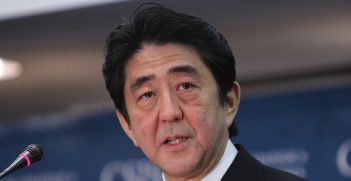Stopping The Spillover

To avoid stagnation in the future world economy, G20 nations need to remain vigilant of their various fiscal and monetary policies and ensure they don’t result in undesirable spillover effects, writes Dr Paola Subacchi. Has the worldfinally shrugged off the effects of the Global Financial Crisis? Are we now back to normal? Certainly, the world economy is accelerating – in 2014, for the first time since 2010, world GDP should grow at a faster rate than in the previous year. According to the forecasts produced by the IMF, the world economy should expand by 3.6 per cent this year compared with 3.0 per cent in 2013, and should continue to grow at a predicted rate of 3.9 per cent in 2015. Against this relatively positive outlook, the prospects for the medium to long term, however, suggest some challenges ahead. Forecasts for the next five years suggest that the world economy is locked in a steady state, at approximately four per cent of annual growth. Emerging markets and developing economies will continue to outperform the advanced economies, but the expected growth rate for the next five years at five per cent is significantly more modest than the one that these countries had experienced since the early 2000s. As a result, the gap in growth rates between these countries and the advanced economies has become narrower. Admittedly, long-term forecasts do not provide much detail and are often off the mark, but the risk in this case is that they might be revised downward. Many uncertainties – from the crisis in Ukraine to debt imbalances in China and the challenge of bringing monetary policy back to normal – are looming; they could potentially disrupt the outlook for the medium term – and even for 2014. A good dose of cautiousness is therefore necessary. The future could be gloomier still if it turns out that, as some argue, the world economy has entered a period of “secular stagnation”. It should not be surprising, then, that the G20 finance ministers and central bankers have committed to raise global growth in the next five years by a total of two per cent, “above the trajectory implied by current policies”.
Domestic Policies vs International Spillovers
Economic growth continues to be the theme around which the G20 tends to coalesce. This has been the case since the Washington Summit in November 2008 – the first of the G20 in its “updated” Leaders Summit format. However, if the G20 seems to be in agreement on supporting and stimulating growth, how to achieve growth and through which measures is more controversial. The lessons from the last five years are unequivocal: countries are more willing to actively cooperate when their economies experience the same shock and go down together. This was the case in the aftermath of the Global Financial Crisis and throughout most of 2009. Even so, different views often stand in the way of positive cooperation. For instance, in 2009, in the weeks before the London Summit, the US and UK on one side, and Germany on the other, got tangled in an unhelpful discussion on what accounted for additional fiscal stimulus: should automatic stabilisers (ie. built-in mechanisms such as unemployment benefits that help mitigate the impact of the downturn) be counted? Even more controversial is the case of unconventional measures of monetary policy implemented by the US Federal Reserve – also by the Bank of England. These measures that go under the name of quantitative easing (QE) have allegedly created difficult-to-manage capital flows to and then from some countries; most notably emerging markets’ economies. In 2010, on the eve of the G20 Seoul Summit, Brazil’s Finance Minister Guido Mantega raised the spectre of “currency wars”, implicitly accusing advanced countries of employing post-crisis recovery policies that bolstered their own economies at the expense of poorer countries. Three years later, in 2013, it was US Federal Reserve chair Ben Bernanke’s announcement of a forthcoming switch in monetary policy that sent shockwaves through emerging market’s economies – in particular, Brazil, Turkey, Indonesia, India and South Africa – or the so-called “Fragile Five”. Likewise, Japan’s “Abenomics” – as the monetary and fiscal policies and structural reforms implemented by Prime Minister of domestic economic policies specifically designed to stimulate economic growth and reverse the low trend of low demand and inflation. But Abenomics also creates adverse spillovers on other economies in the region. Neighbours, especially South Korea and China have therefore accused Japan of implementing “beggar your neighbour” policies to weaken the yen and create an unfair advantage for their exports. In 2013, the Korean won appreciated by approximately 25 per cent over the yen.
Normalising and Rebalancing
Focusing on growth per se is not enough, and the G20 should also aim at improving coordination in order to reduce the impact of spillovers from systemically important countries such as the US and Japan, but also the Euro area, the UK and China. Alas, managing spillovers is likely to be even more challenging in the medium term because of two overlapping trends: advanced economies retrenching from ultra- accommodative monetary policy and going back to “normal”, while retaining their grip on fiscal policy; and China rebalancing its model of growth. The shift in monetary policy in the US should therefore be gradual and clearly communicated to financial markets so as to avoid fostering financial instability. Hopefully, stronger growth in the US and less-accommodative monetary policy should provide a bit of oxygen for the Euro area (a region that still experiences serious imbalances) through a weaker currency. But all eyes need to be on China, and on the double act of reforming the banking and financial sector and rebalancing the economy. Ever since entering the current post-crisis period, the world economy has never before been so interconnected. China is a critical linchpin of this system and holds the key to future prosperity. But rebalancing could be problematic for countries in the region that have become increasingly dependent on China’s demand for commodities – Australia, for example, is likely to suffer from China’s slower growth as China makes up about one-third of its exports. But all eyes need to be on China, and on its double act of reforming its banking and financial sector and rebalancing the economy. Never has the world economy been so interconnected as in today’s post-crisis period. China is a now a critical part of this system and holds the key to future prosperity. Rebalancing could be problematic for countries in the region that have become increasingly dependent on China’s demand for commodities – Australia, for example, is likely to suffer from China’s slower growth as China makes up about one-third of its exports. The G20 shouldbe alert to ensure that the two forces now driving the world’s economy – normalising and rebalancing – do not also end up short-circuiting it. Dr Paola Subacchi is the Research Director of International Economics, Chatham House. This is an extract from G20: Words into Action Brisbane 2014, to be published by Faircount Media in association with the Australian Institute of International Affairs in October 2014.





